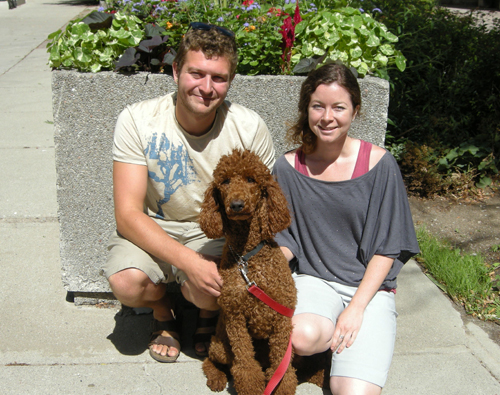
U of G student Lydia Bryce had been helping to give tours – in French – of two historic sites near Trois-Rivières, Que., for a couple of weeks when a group of English-speaking tourists requested a tour in English. Since English is her first language, it should have been easy.
“Actually, it was surprisingly challenging,” she says. “I’d learned all the vocabulary in French, so when it came to explaining something I’d been calling the “meule,” I couldn’t figure out how to translate it into English. Finally someone said “grindstone,” and I realized, yes, that’s it. It was weird to know the name in French and not in my own first language.”
Between their course work and thesis defence, students earning a master’s degree in French studies at U of G are required to complete a three-week unpaid internship speaking French. This year, three students spent their time in Guelph French-immersion classrooms, while three others went further afield. Bryce and Jennifer Zettel worked as tour guides near Trois-Rivières, and Chris Broughton worked at the Granby Zoo just outside of Montreal.
“It was a very francophone environment,” he says. “There were maybe three or four people who could speak some English.”
Broughton worked with the zoo’s horticultural team, planting trees and greenery and helping to rebuild enclosures for the leopards. “They let me use a chainsaw, drive the tractors and walk into the enclosures with some of the animals,” he says, although he didn’t get that close to the leopards.
Bryce and Zettel worked at two historical sites: an old rectory and a site containing a flour mill and saw mill. “Our job was to welcome visitors, give a tour, explain the history and culture connected to the site, and answer questions, says Zettel. They also planned an entire day of activities for a group of homeschooled children. Zettel says her French skills certainly got a work-out. “It can be hard when people are speaking quickly and asking you questions. But for the most part, people were very encouraging and patient.”
To add to the experience of being immersed in French, Bryce and Zettel both stayed with local families. “I was surprised to learn how important the French language was to the people I stayed with,” says Bryce. “They were delighted that an anglophone would want to speak their language. And the other guides at the sites confessed that they’d thought it would be horrible having us there, but at the end of our three weeks, they didn’t want us to leave.”
Broughton camped out in his van for his three weeks of work, first in a national parks parking lot and then a WalMart parking lot. He jokes that his French is probably worse now than before his work term.
“My co-workers spoke a lot of slang, and I’ve picked up quite a few words that I probably shouldn’t have. We talked about everything, including separatism.”
Broughton’s job involved a lot of physical labour, and he feels he was able to prove himself by working hard. One of his co-workers eventually acknowledged that Broughton was “not bad for an English guy.”
Both Zettel and Bryce discovered a new interest in Canadian history during their stints as tour guides. Bryce, who plans to eventually complete a PhD, is interested in finding employment in a museum; Zettel is heading to teacher’s college but hopes to have more opportunities to explore Canadian history.
Broughton will be travelling to France this fall. He says this work experience taught him that “our language barrier is one of the biggest problems in Canada. People who speak only English don’t get to really meet or contact those who speak only French. We need to break that barrier down so people can really talk to each other in both languages. I think it’s more useful to be able to speak the language than write the essays.”